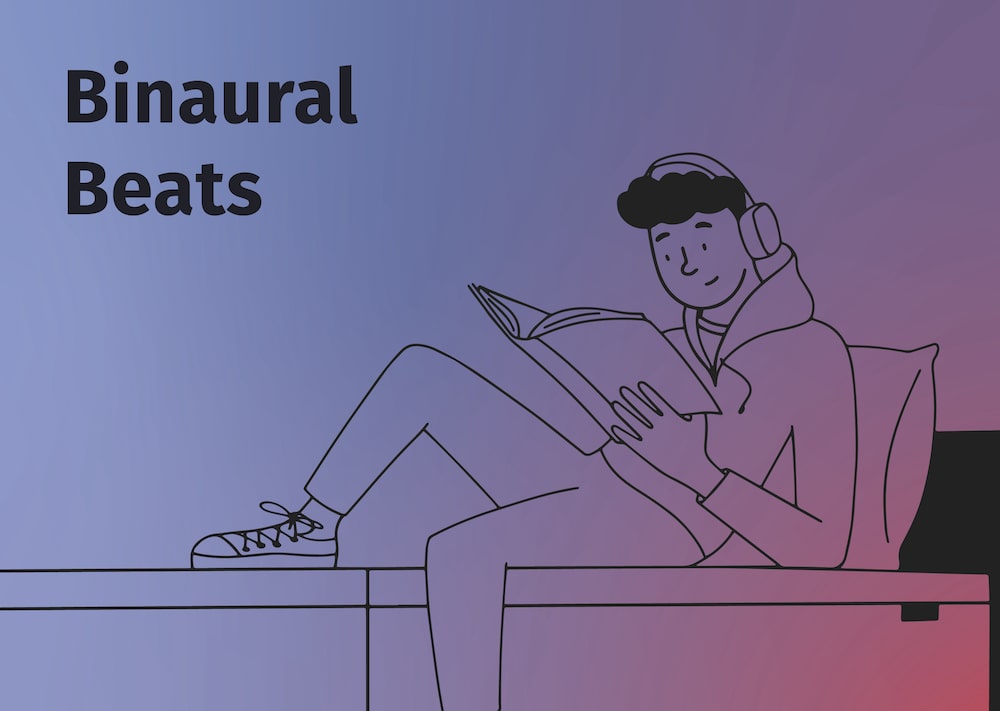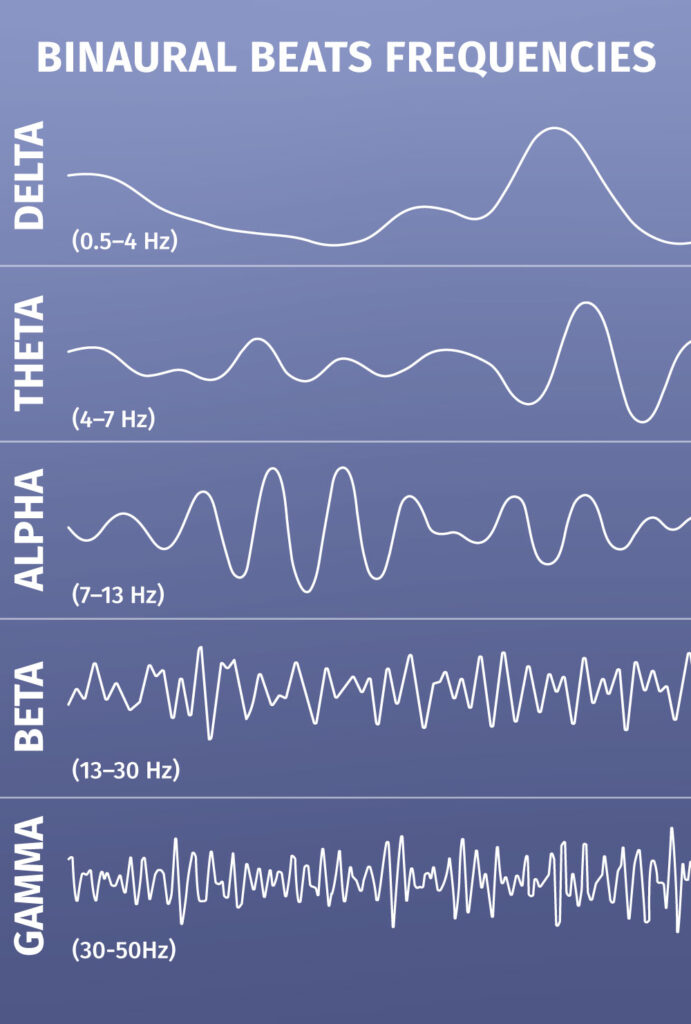If you struggle with sleep issues or your mental health, binaural beats might be able to help! Binaural beats are known for inducing deep relaxation and sleepiness and improving your mental state.
Curious about what binaural beats are and how they work? Read on below! We explain different binaural beat frequencies, explore the effects of binaural beats, and even suggest some beats to test out at home.
What Are Binaural Beats?
When you listen to two tones with slightly different frequencies at the same time, your brain melds them together into a single beat as you hear them. This produces a beat with its own frequency, called a binaural beat. According to behavioral psychologist Justin Gasparovic, binaural beats are a form of sound therapy used for things like “meditation, sleep, and even treating mental health conditions.”
There are a variety of different frequencies of binaural beats, and each one produces a different result. We spoke to Edna Skipljak, M.D. and editor at Instador, to learn what each beat does. Take a look at the list below to learn more. Each frequency is measured in hertz (Hz).
- Delta beats (0.1-4 Hz) are associated with deep sleep and meditation. Listening to Delta waves before bed might help you relax and fall asleep.
- Theta beats (4-8 Hz) are similar to Delta beats and might induce deep relaxation and sleep. Using Theta beats at bedtime might slow down your brainwaves and make it easier to drift off.
- Alpha beats (8-12 Hz) help you to relax while staying alert. They can help you reduce stress and anxiety, which can make it easier to fall asleep at night. According to Lauren Barry, MS and Clinical Director of Level Up, Alpha waves can also enhance happiness!
- Beta beats (12-30 Hz) may help you maintain your normal waking state. Barry says beta waves may also help increase concentration, alertness, problem-solving, and memory.
Pros and Cons of Binaural Beats
There are plenty of great reasons to test out binaural beats, but a few cons as well. We describe the benefits of binaural beats, as well as some of the drawbacks, below.
Binaural Beats Benefits
Jessica Miller, Licensed Mental Health Counselor, says that some positive effects of binaural include anxiety and stress reduction, improved confidence, increased focus and concentration, increased creativity, cognitive enhancement, improved sleep quality, enhanced mood, and ease of entry into a meditative state.
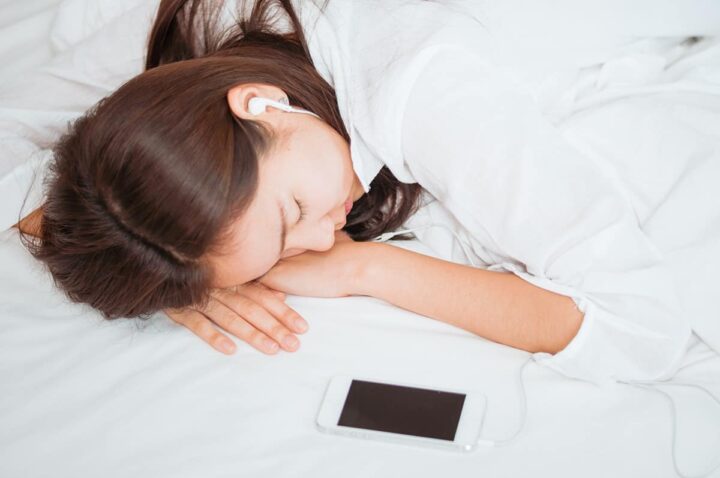
If you’re looking for a gentle non-invasive insomnia treatment, or a way to get better sleep, binaural beats could be a great option for you. Similarly, listening to binaural beats while you meditate can make it easier to induce deep relaxation. If you don’t have a specific goal in mind, but just want to improve your cognition, binaural beats might also be a good fit for you.
Binaural Beats Considerations
Katie Adam, Psychologist and Mental Health First Aid Trainer warns that some “brainwave entrainment software” like binaural beats can be dangerous for patients with epilepsy, people who would be in danger if they dozed off (i.e. don’t use binaural beats while the oven is on), infants, mothers-to-be, and people with heart conditions or who have pacemakers.
Skopljak, MD, also notes that binaural beats might not be effective for everyone. In fact, they could cause headaches or other side effects in some people, and those with auditory problems may not be able to use them at all. Barry also notes that you should be careful about how loud you listen to the beats, as prolonged exposure to loud noises can lead to hearing loss.
Do Binaural Beats Work?
Miller says that the effects of binaural beats vary from person to person, but they do work. According to Skipljak, several studies have suggested that binaural beats do work to alleviate anxiety, depression, and PTSD. In fact, Skipljak was part of the research team on a study about binaural beats and anxiety that showed the use of binaural beats can reduce symptoms! So binaural beats are definitely worth a try.
How to Use Binaural Beats for Sleep
To use binaural beats for sleep, get out your headphones and listen to one beat in your left ear and the other in your right ear. The sounds will combine into a new sound, and you’ll get the binaural beat stimulation you’re looking for.
It’s important to choose the right beats if you’re using binaural beats for sleep. Low frequency beats are best for inducing a sleep state. Miller says that delta wave beats can lengthen stage three sleep. Stage three sleep occurs just before REM sleep and is one of the most important sleep stages for waking up feeling rested in the morning. In this stage of sleep, your brain is producing long slow waves that help repair your body and mind. So, if you’re struggling with sleep issues, try playing delta waves in your headphones before you go to bed. Theta beats, which also induce brain wave activity that can lead to sleep, might help if you find them more relaxing.
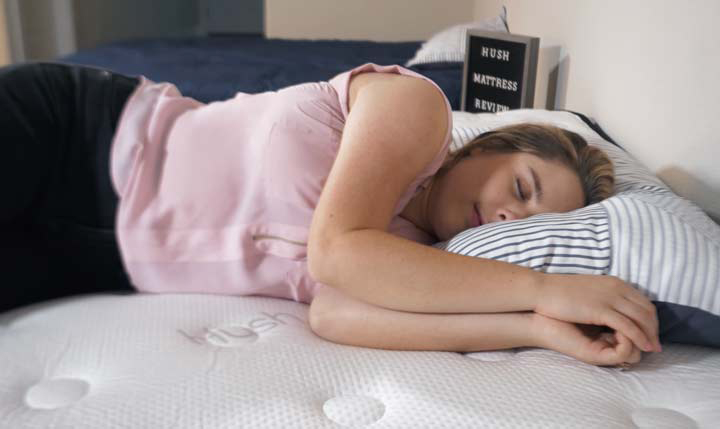
If you don’t like listening to white noise or different sounds before bedtime, another option is trying out alpha waves during the daytime. Listening to alpha waves (and practicing some mindfulness) during the day can reduce stress and anxiety and make it easier to sleep at night. They may also improve cognitive function and long-term memory!
Want to learn more about the stages of sleep? Check out our complete guide to your sleep cycle.
The Best Binaural Beats for Sleep
So, which are the best binaural beats for sleep? We’ve got some options for you below!
Spotify Sleep Playlist
- Spotify offers a great playlist of various different binaural beats for sleep and focus.
- This Binaural Beats:Sleep playlist offers a variety of delta wave options to help you fall asleep fast.
- And this Binaural Beats: Stress Relief playlist features a ton of alpha wave options to help you relieve stress during the day to sleep better at night.
Youtube Binaural Beats
- This deepest healing sleep playlist on Youtube is a calming delta wave option.
- This theta wave lucid dreaming playlist is also a good nighttime option.
- If you prefer alpha waves, check out this alpha wave frequency next time you meditate.
- Beta waves are not ideal for sleeping, but this super intelligence beta frequency playlist could be a great addition to your next study session.
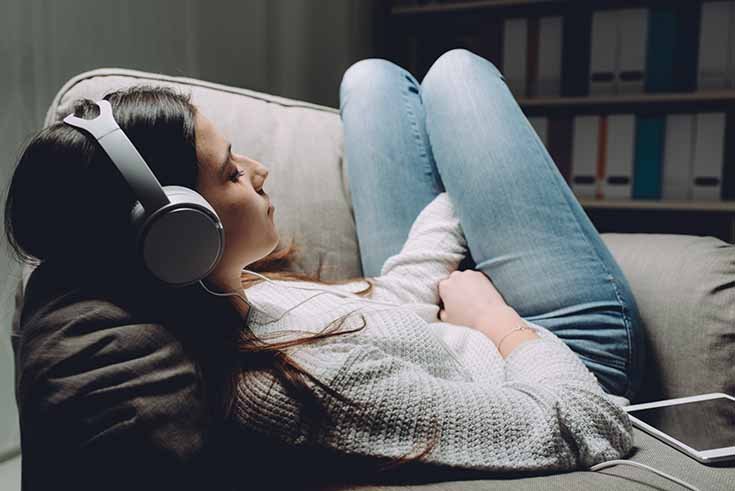
FAQs
For more information about binaural beats, check out our FAQ section below.
How do you correctly listen to binaural beats?
To correctly listen to binaural beats, pull out a pair of headphones. This will let you play different tones in each ear. We recommend listening to binaural beats in a quiet place for about thirty minutes either before bed or during meditation.
How long does it take for binaural beats to work?
During one session, it will take 4-10 minutes to start feeling the effects of binaural beats. In some cases, it might take up to 30 minutes for the beats to work. Binaural beats work best if you listen daily for about three weeks.
Which frequency is best for sleeping?
Delta and theta waves are best for sleeping. These binaural beats have frequencies between 0.1-8 Hz.
How loud should I listen to binaural beats?
We recommend listening to binaural beats at a low volume. They should be loud enough to hear, but soft enough that they can fade into the background as you meditate or drift off to sleep.
Final Thoughts
We hope this article answered all your questions about binaural beats! These beats are a great way to improve your mental health or sleep, and we recommend trying them at least once. Remember to use working headphones and listen on a low volume to feel the full effects of the beats. If you’re looking to improve your sleep, choose theta or delta waves. If you want to take your meditation to the next level, listen to alpha waves.

